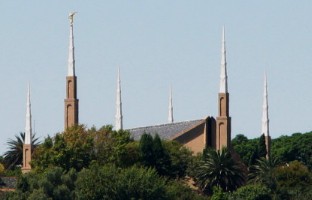Taking Utah to Africa

Earlier generations would have been startled to see a hit Broadway musical on the theme of Mormon missionaries in Africa. The Book of Mormon is a popular and critical success, and it has stirred debate about the acceptable limits of religious satire. Lost in the story about this unusual theatrical success has been the reality of Mormon missionary accomplishments around the world.
In fact, when we look at Mormon expansion in Africa itself, one pressing question demands attention: Why is the whole continent not already Mormon? The answer tells us a great deal not just about Mormonism but about the wider story of Western-derived churches and why they succeed or fail in the Global South.
Mormonism has deep roots in southern Africa, where pioneer missionaries were setting up shop as early as 1853. For decades, though, the church's refusal to grant the priesthood to blacks stifled any possible expansion, and that ban was not lifted until 1978. Since then, Mormonism has grown respectably, establishing temples in Ghana, Nigeria and South Africa. Today, there are about 300,000 African Mormon believers. This is a solid record, but nothing spectacular by African standards, where upstart churches easily gain followings in the millions.





